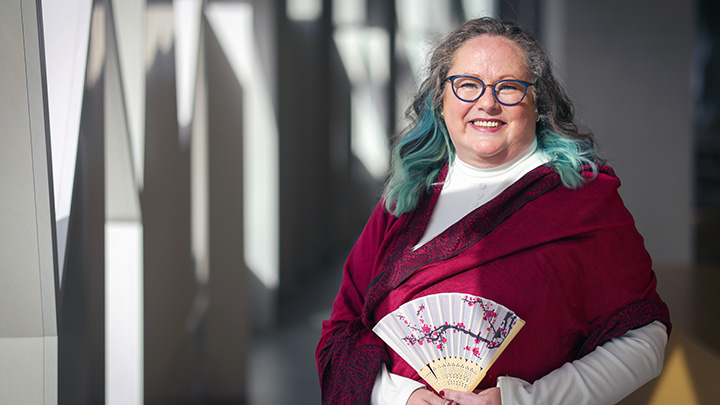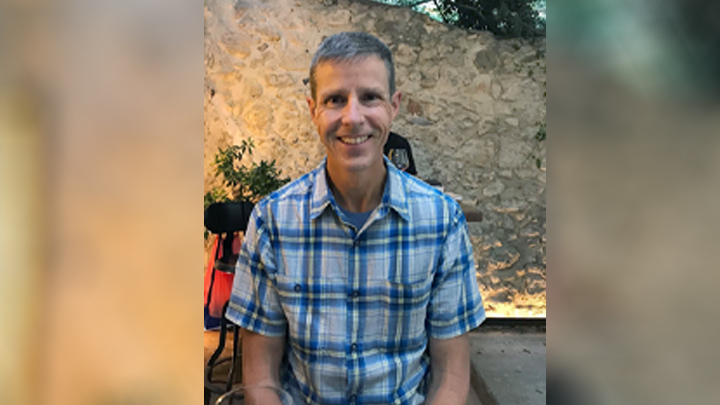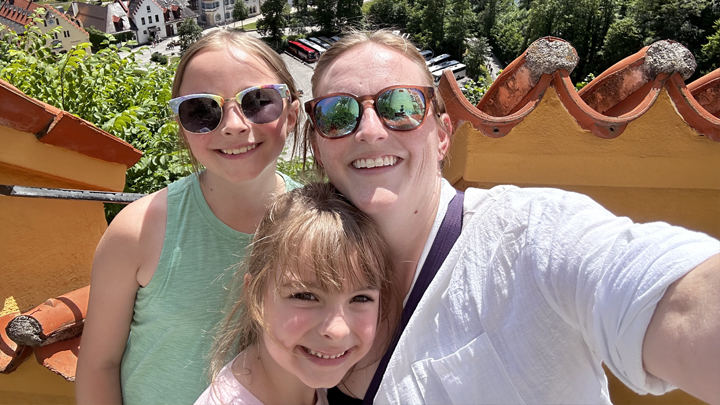
March 3, 2025

Following a stroke, Tara Livingstone lives with aphasia, a condition which confuses her words and numbers, making conversation difficult. “I can’t memorize things. I lost so much — abilities, independence and, most painfully, the self I had been for 50 years.” She’s greatly benefited from her rehabilitation as well as the education, training and resources of the speech-language pathology services at Alberta Health Services. Photo by Leah Hennel.

Kevin Lindland, a speech-language pathologist for Rehabilitation & Specialized Clinical Services and professional practice lead for Calgary Zone, worked with Livingstone in the acute phase of her stroke recovery, and helped her find the courage to speak before the Canadian Stroke Congress to share her difficult journey. “Her presentation on her lived experience went over particularly well. She got a standing ovation and a few tears in the audience.” Supplied.

Carolyn Knoechel, a speech-language pathologist with the Calgary Early Supported Discharge team, enjoys seeing people make real connections again with family and friends after a life-changing medical event. “One of the biggest pieces is seeing them be able to participate in their life, even if it looks different. Getting back to those things they love again — it makes me feel good as well as them.” She’s seen here with daughters Bennett, left, and Chloe on a family holiday. Supplied.
Story by Gregory Kennedy & Janine Poersch | Photo by Leah Hennel
CALGARY — Imagine your favourite song coming on the radio, and how much you’d love to sing along. But the words just won’t come. You draw a total blank. Or every time you speak, putting a sentence together can be a mentally tortuous affair — and out of the blue — you now sound like you have a foreign accent, despite being born in Canada with English as your only language.
For Tara Livingston, her bleak new reality hit in the blink of an eye, following a hemorrhagic stroke on Nov. 8, 2023. Her brain bleed left her living with aphasia, a condition that causes people to have problems with communicating, including speaking, writing and understanding speech and written words.
“It breaks my heart. All of my lyrics are gone. The soundtrack of my life; it’s all gone,” says the former Anglican priest and divorce mediator, in halting sentences, with brief pauses, as she gathers and assembles her thoughts before speaking.
“I can sing karaoke, because I can read. Otherwise, I do know the songs, but I can only hum along. It’s no longer relaxing to me to listen to music. It just makes me sad. So now I only listen to classical music that doesn’t have any words.”
The 55-year-old, who previously took pride in her public-speaking skills and a gift for engaging her audiences with humour and heart, also now finds herself vexed by numbers. “If you tell me your phone number right now, literally you have to tell it to me one number at a time as I write it down. I know my area code — I memorized that — but after that, if you tell me three numbers, it’s too much for me.”
But Livingston is not alone in her struggles. She’s found a strong ally and healer thanks to her speech-language pathology care team and the Communication Access initiative of Alberta Health Services, accessing help to adapt, relearn and regain as much of her lost abilities as nature will allow.
As well, the initiative is growing its presence across Alberta making more education, training and resources available to help healthcare staff provide the best care and achieve the best outcomes for people with aphasia, which affects about 30 per cent of stroke survivors. More than 100,000 Canadians live with it.
“Tara’s very bright. Very competent. While she sometimes struggles to get her information across or articulate her words, she comprehends everything that’s going on,” says Kevin Lindland, speech-language pathology professional practice lead, Rehabilitation & Specialized Clinical Services, who gave her speech therapy in the weeks immediately after her stroke at Foothills Medical Centre. “She’s a very strong advocate for herself, she’s competent, and needs to be treated competently.”
While some stroke survivors are left with degrees of paralysis on a side of their body, or other mobility or physical issues, Livingston experienced no issues in this regard, which renders her disability invisible to those she meets, which can leave her flustered, or worsen her aphasia in stressful situations.
“I have times when it’s very difficult for me to even think about talking to strangers. I’m afraid that people are going to treat me like I’m not smart. That I’m not competent. And sometimes, this gets me down.
“For me, I have to deal with it through humour. This is why I tell people that I’m from Chernobyl,” she says, then laughs, referring to her Foreign Accent Syndrome (FAS), a rare speech disorder that causes a person's voice to sound like they have a foreign accent. It's characterized by a sudden change in speech patterns, such as intonation, timing and tongue placement. “I now sound Russian, but I was born in Hamilton.”
“I think Tara’s a really great example of someone who, on the surface, might not look like they need communication supports in terms of communication-access strategies,” says Carolyn Knoechel, a speech-language pathologist with Calgary Early Supported Discharge team.
“We all take communication for granted. It comes so easily for many of us. When we see clients who now have this brand-new barrier — and how they’re struggling to overcome it — for me it’s such a big, big win when they’re able to communicate something they weren't able to when we first saw them.”
Albertans are benefitting from personalized speech-language pathology services and broader, society-level efforts to ensure Communication Access is a fundamental human right that we can all help to come true.
“Through our Communication Access initiative, we’re reminding healthcare staff that the people walking into your clinic or your service are not always going to look like they need help communicating. That's part of why it's important to always look deeper into it — and ask the people themselves — how we can help.”
Lindland adds the initiative began taking shape in 2018 through the efforts of a provincial group led by Health Professions Strategy & Practice.
“We’ve been working on this for a few years and gradually improving the number of resources and tools we have on Insite and for all healthcare providers as we bring a culture of communication into AHS. We also encourage individuals who have speech, language or hearing deficits, and their families, to effectively participate in the care they receive.”
“One of the most important things that people can do is to just educate themselves on our strategies for better communication,” adds Knoechel.
“They're quite simple and can have a really big impact. Things like giving people more time to respond. Respecting their potential Communication Access needs, perhaps by writing down keywords, giving choices, and simplifying your language for them by taking out all the extra flowery stuff we tend to add.
“It’s vitally important to acknowledge their competence and respect their autonomy as the person who's making the decision about their care.”
An early-adopter initiative through the provincial Allied Health Professions team is also currently underway to encourage more sites and teams across the province to achieve a communication-accessible designation. This is being done through staff education along with onsite posters, tools and materials.
One site that’s embraced the pilot and achieved a “communication friendly” designation is WestView Health Centre in Stony Plain, with a firm belief that communication lies at the heart of every healthcare interaction.
When Lindland and Knoechel were invited to speak on Communication Access before the Canadian Stroke Congress last November — they shared the opportunity with Livingston, who courageously accepted.
“When Kevin asked me to go and talk about my aphasia, I felt very privileged to have been asked, but I didn’t want it to be complicated by my Foreign Accent Syndrome,” she recalls. “But because I’d been a public speaker — this was my life — I went for it.
“For the Congress, I focused on making use of the three skills that I still have: I know how to work a room when I’m speaking. I can still respond to an audience. And I’m a storyteller.
“What I said in my speech, around 1,000 words, would usually take me about 20 minutes to write and edit — but this one took me around three months to put together, and to figure it out. I had to keep repeating it to get it to flow for my ear, and I had my computer read it out for me, too.”
The big day came, and after a presentation infused with heart and laughter, Livingston won a standing ovation, with more than a few tears in the audience. Now she’s thinking even bigger: “My biggest goal is to do a TEDx talk.”
Knoechel reflects on being onstage that day, and what she loves about her job.
“Seeing people make real connections again, whether it's with their family or their friends, gives me great satisfaction. For me, that's one of the biggest pieces — seeing them able to participate in their life again, even if it looks different. Getting back to the things they love again, it makes me feel good, as well as them.”
To fully embrace “Tara 2.0”, as Livingston describes her reinvention, she went so far as to far as to hold a farewell ceremony for her old self.
“In the summer, I had a little funeral for myself. It was also a celebration of transformation, because I was wallowing in self-pity there, and I needed to have an ending point of that.
“So I burned a sermon that I had hand-written. I burned it to signify that I may never get back my language like that. And then, to be open to opportunities to do whatever the world will bring for me.
“Since then, I’ve been feeling so much better about my future.”
Clearly no longer wallowing, and to crown her interview, she declares crisply and confidently:
“I want you to understand … that I’m fantastic!”
Enjoy more of Tara’s story:
“I’d like figure out how to share my experience with more people.”
Watch video of Tara Livingston’s presentation before the Canadian Stroke Congress. Visit her website, Stroke of Genius or her YouTube Channel.
Communication Access & Aphasia Care:
How family and caregivers can help:
Tips for better communication:
For more information about Communication Access, visit MyHealth.Alberta.ca. To find services for adults with speech, language and/or hearing needs, visit AHS.ca/AdultRehab.